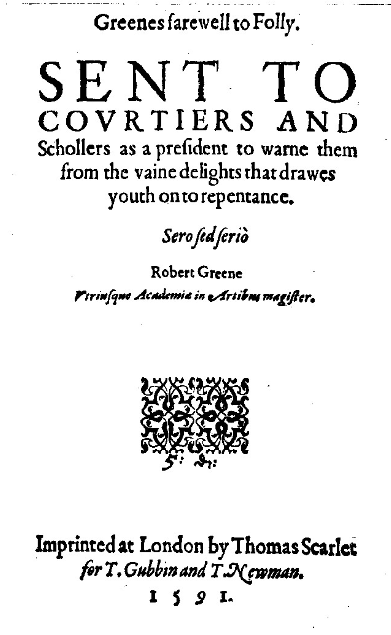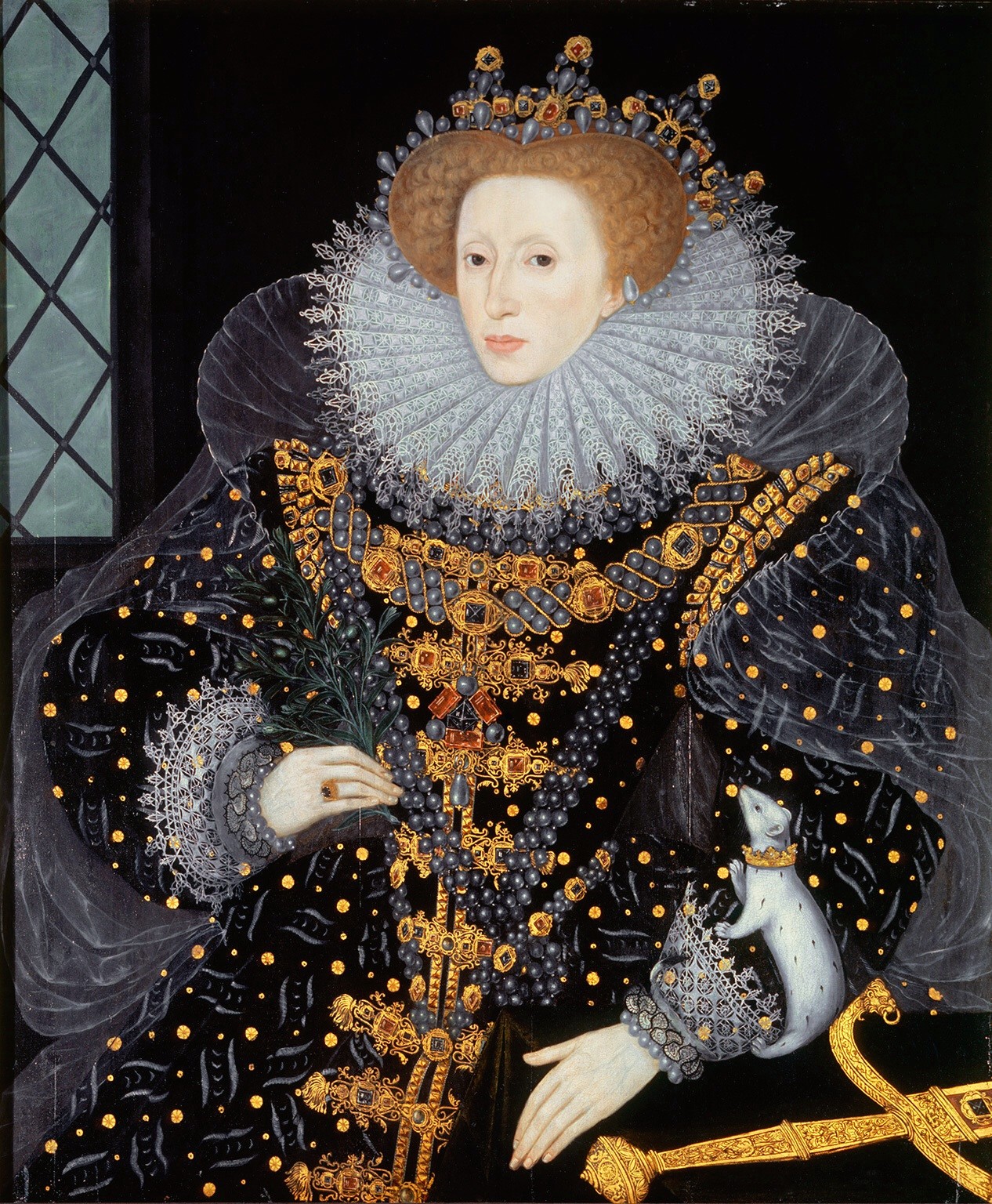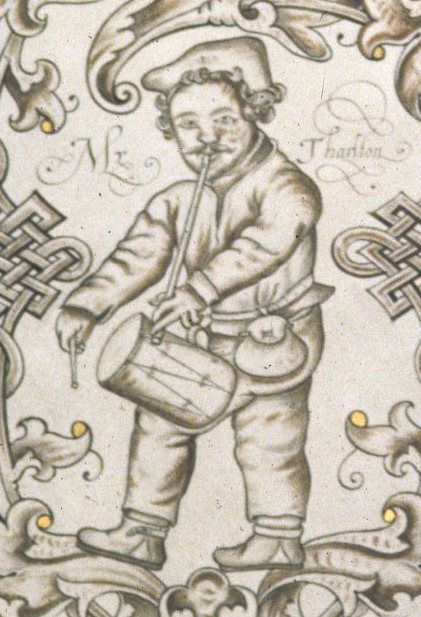|
Selimus (play)
''Selimus'', or ''The Tragedy of Selimus, Sometime Emperor of the Turks'', is a dramatic tragedy generally attributed to the authors Robert Greene and Thomas Lodge. It is an early example of a "Turk play", which became a popular dramatic subject during the English Renaissance. Published in 1594, the play is loosely – and historically inaccurately – based on Selim I, a real Emperor of the Ottoman Empire in the 1500s.Sahiner, Mustafa. “Oriental Matter Revisited: Representations of the “Turk” in Robert Greene’s Selimus.” Journal of Arts and Sciences. December 2008. The play centres on Selimus, who is the youngest son of Bajazet, the current Emperor of Turkey, and how he plans to take the crown away from his father. The play follows the family turmoil that ensues as Selimus, Acomat, and Corcut, all sons of Bajazet, war and murder in an attempt to control the crown. Nearly all of Bajazet's line of descent is eradicated by the end of the play, and Selimus is left to rule ... [...More Info...] [...Related Items...] OR: [Wikipedia] [Google] [Baidu] |
Robert Greene (dramatist)
Robert Greene (1558–1592) was an English author popular in his day, and now best known for a posthumous pamphlet attributed to him, '' Greene's Groats-Worth of Witte, bought with a million of Repentance'', widely believed to contain an attack on William Shakespeare. Robert Greene was a popular Elizabethan dramatist and pamphleteer known for his negative critiques of his colleagues. He is said to have been born in Norwich. He attended Cambridge where he received a BA in 1580, and an M.A. in 1583 before moving to London, where he arguably became the first professional author in England. Greene was prolific and published in many genres including romances, plays and autobiography. Family According to the author Brenda Richardson, the "chief problem" in compiling a biography of Robert Greene was his name. ''Robert'' was one of the most popular given names of the era and ''Greene'' was a common surname. L. H. Newcomb suggests that Robert Greene "was probably the Robert Greene, s ... [...More Info...] [...Related Items...] OR: [Wikipedia] [Google] [Baidu] |
Thomas Lodge
Thomas Lodge (c. 1558September 1625) was an English writer and medical practitioner whose life spanned the Elizabethan and Jacobean periods. Biography Thomas Lodge was born about 1558 in West Ham, the second son of Sir Thomas Lodge, Lord Mayor of London, by his third wife Anne (1528–1579), daughter of Henry Luddington (died 1531), a London grocer. He was educated at Merchant Taylors' School and Trinity College, Oxford; taking his BA in 1577 and MA in 1581. In 1578 he entered Lincoln's Inn, where, as in the other Inns of Court, a love of letters and a crop of debts were common. Lodge, disregarding the wishes of his family, took up literature. When the penitent Stephen Gosson had (in 1579) published his ''Schoole of Abuse'', Lodge responded with ''Defence of Poetry, Music and Stage Plays'' (1579 or 1580), which shows a certain restraint, though both forceful and learned. The pamphlet was banned, but appears to have been circulated privately. It was answered by Gosson i ... [...More Info...] [...Related Items...] OR: [Wikipedia] [Google] [Baidu] |
English Renaissance
The English Renaissance was a Cultural movement, cultural and Art movement, artistic movement in England from the early 16th century to the early 17th century. It is associated with the pan-European Renaissance that is usually regarded as beginning in Italy in the late 14th century. As in most of the rest of northern Europe, England saw little of these developments until more than a century later. Renaissance style and ideas, however, were slow to penetrate England, and the Elizabethan era in the second half of the 16th century is usually regarded as the height of the English Renaissance. However, many scholars see its beginnings in the early 16th century, during the reign of Henry VIII. The English Renaissance is different from the Italian Renaissance in several ways. The dominant art forms of the English Renaissance were literature and music. Visual arts in the English Renaissance were much less significant than in the Italian Renaissance. The English period began far later than ... [...More Info...] [...Related Items...] OR: [Wikipedia] [Google] [Baidu] |
Selim I
Selim I ( ota, سليم الأول; tr, I. Selim; 10 October 1470 – 22 September 1520), known as Selim the Grim or Selim the Resolute ( tr, links=no, Yavuz Sultan Selim), was the Sultan of the Ottoman Empire from 1512 to 1520. Despite lasting only eight years, his reign is notable for the enormous expansion of the Empire, particularly his conquest between 1516 and 1517 of the entire Mamluk Sultanate of Egypt, which included all of the Levant, Hejaz, Tihamah and Egypt itself. On the eve of his death in 1520, the Ottoman Empire spanned about , having grown by seventy percent during Selim's reign. Selim's conquest of the Middle Eastern heartlands of the Muslim world, and particularly his assumption of the role of guardian of the pilgrimage routes to Mecca and Medina, established the Ottoman Empire as the pre-eminent Muslim state. His conquests dramatically shifted the empire's geographical and cultural center of gravity away from the Balkans and toward the Middle East. By th ... [...More Info...] [...Related Items...] OR: [Wikipedia] [Google] [Baidu] |
Ottoman Empire
The Ottoman Empire, * ; is an archaic version. The definite article forms and were synonymous * and el, Оθωμανική Αυτοκρατορία, Othōmanikē Avtokratoria, label=none * info page on book at Martin Luther University) // CITED: p. 36 (PDF p. 38/338) also known as the Turkish Empire, was an empire that controlled much of Southeast Europe, Western Asia, and Northern Africa between the 14th and early 20th centuries. It was founded at the end of the 13th century in northwestern Anatolia in the town of Söğüt (modern-day Bilecik Province) by the Turkoman tribal leader Osman I. After 1354, the Ottomans crossed into Europe and, with the conquest of the Balkans, the Ottoman beylik was transformed into a transcontinental empire. The Ottomans ended the Byzantine Empire with the conquest of Constantinople in 1453 by Mehmed the Conqueror. Under the reign of Suleiman the Magnificent, the Ottoman Empire marked the peak of its power and prosperity, as well a ... [...More Info...] [...Related Items...] OR: [Wikipedia] [Google] [Baidu] |
Queen Elizabeth's Men
Queen Elizabeth's Men was a playing company or troupe of actors in English Renaissance theatre. Formed in 1583 at the express command of Queen Elizabeth, it was the dominant acting company for the rest of the 1580s, as the Admiral's Men and the Lord Chamberlain's Men would be in the decade that followed. Foundation Since the Queen instigated the formation of the company, its inauguration is well documented by Elizabethan standards. The order came down on 10 March 1583 (new style) to Edmund Tilney, then the Master of the Revels; though Sir Francis Walsingham, head of intelligence operations for the Elizabethan court, was the official assigned to assemble the personnel. At that time the Earl of Sussex, who had been the court official in charge of the Lord Chamberlain's Men in its first Elizabethan incorporation, was nearing death. The Queen's Men assumed the same functional role in the Elizabethan theatrical landscape as the Lord Chamberlain's Men before and after them did: it wa ... [...More Info...] [...Related Items...] OR: [Wikipedia] [Google] [Baidu] |
Alexander Balloch Grosart
Alexander Balloch Grosart (18 June 182716 March 1899) was a Scottish clergyman and literary editor. He is chiefly remembered for reprinting much rare Elizabethan literature, a work which he undertook because of his interest in Puritan theology. Life The son of a building contractor, he was born at Stirling and educated at the University of Edinburgh. In 1856 he became a minister of the United Presbyterian Church of Scotland at Kinross, serving the congregation known as First United Presbyterian Church. In 1865 he went to Liverpool, and three years later to Blackburn. He resigned from the ministry in 1892, and died at Dublin. Editorial work Among the first writers whose works he edited were the Puritan writers, Richard Sibbes, Thomas Brooks and Herbert Palmer. Editions of Michael Bruce's ''Poems'' (1865) and Richard Gilpin's ''Demonologia sacra'' (1867) followed. In 1868 he brought out a bibliography of the writings of Richard Baxter, and from that year until 1876 he was oc ... [...More Info...] [...Related Items...] OR: [Wikipedia] [Google] [Baidu] |
Janissaries
A Janissary ( ota, یڭیچری, yeŋiçeri, , ) was a member of the elite infantry units that formed the Ottoman Sultan's household troops and the first modern standing army in Europe. The corps was most likely established under sultan Orhan (1324–1362), during the Grand vizier, Viziership of Alaeddin Pasha (vizier), Alaeddin. Janissaries began as elite corps made up through the devşirme system of Ghilman, child levy, by which Christians, Christian Albania under the Ottoman Empire, Albanians, Romanians, Armenians in the Ottoman Empire, Armenians, Ottoman Bulgaria, Bulgarians, Croats, Ottoman Greeks, Greeks and Ottoman Serbs, Serbs were taken, levied, subjected to Forced circumcision, circumcision and Forced conversion#Islam, conversion to Islam, and incorporated into the Ottoman army. They became famed for internal cohesion cemented by strict discipline and order. Unlike typical slaves, they were paid regular salaries. Forbidden to marry before the age of 40 or engage in tra ... [...More Info...] [...Related Items...] OR: [Wikipedia] [Google] [Baidu] |
Smederevo
Smederevo ( sr-Cyrl, Смедерево, ) is a city and the administrative center of the Podunavlje District in eastern Serbia. It is situated on the right bank of the Danube, about downstream of the Serbian capital, Belgrade. According to the 2011 census, the city has a population of 64,105, with 108,209 people living in its administrative area. Its history starts in the 1st century BC, after the conquest of the Roman Empire, when there existed a settlement by the name of ''Vinceia''. The modern city traces its roots back to the Late Middle Ages when it was the capital (1430–39, and 1444–59) of the last independent Serbian state before Ottoman conquest. Smederevo is said to be the city of iron ( sr, / ) and grapes (). Names In Serbian, the city is known as ''Smederevo'' (Смедерево), in Latin, Italian, Romanian and Greek as ''Semendria'', in Hungarian as ''Szendrő'' or ''Vég-Szendrő'', in Turkish as ''Semendire''. The name of Smederevo was first r ... [...More Info...] [...Related Items...] OR: [Wikipedia] [Google] [Baidu] |
Byzantium
Byzantium () or Byzantion ( grc, Βυζάντιον) was an ancient Greek city in classical antiquity that became known as Constantinople in late antiquity and Istanbul today. The Greek name ''Byzantion'' and its Latinization ''Byzantium'' continued to be used as a name of Constantinople sporadically and to varying degrees during the thousand year existence of the Byzantine Empire. Byzantium was colonized by Greeks from Megara in the 7th century BC and remained primarily Greek-speaking until its conquest by the Ottoman Empire in AD 1453. Etymology The etymology of ''Byzantium'' is unknown. It has been suggested that the name is of Thracian origin. It may be derived from the Thracian personal name Byzas which means "he-goat". Ancient Greek legend refers to the Greek king Byzas, the leader of the Megarian colonists and founder of the city. The name ''Lygos'' for the city, which likely corresponds to an earlier Thracian settlement, is mentioned by Pliny the Elder in his '' Natu ... [...More Info...] [...Related Items...] OR: [Wikipedia] [Google] [Baidu] |
Janissaries
A Janissary ( ota, یڭیچری, yeŋiçeri, , ) was a member of the elite infantry units that formed the Ottoman Sultan's household troops and the first modern standing army in Europe. The corps was most likely established under sultan Orhan (1324–1362), during the Grand vizier, Viziership of Alaeddin Pasha (vizier), Alaeddin. Janissaries began as elite corps made up through the devşirme system of Ghilman, child levy, by which Christians, Christian Albania under the Ottoman Empire, Albanians, Romanians, Armenians in the Ottoman Empire, Armenians, Ottoman Bulgaria, Bulgarians, Croats, Ottoman Greeks, Greeks and Ottoman Serbs, Serbs were taken, levied, subjected to Forced circumcision, circumcision and Forced conversion#Islam, conversion to Islam, and incorporated into the Ottoman army. They became famed for internal cohesion cemented by strict discipline and order. Unlike typical slaves, they were paid regular salaries. Forbidden to marry before the age of 40 or engage in tra ... [...More Info...] [...Related Items...] OR: [Wikipedia] [Google] [Baidu] |
English Renaissance Plays
English usually refers to: * English language * English people English may also refer to: Peoples, culture, and language * ''English'', an adjective for something of, from, or related to England ** English national identity, an identity and common culture ** English language in England, a variant of the English language spoken in England * English languages (other) * English studies, the study of English language and literature * ''English'', an Amish term for non-Amish, regardless of ethnicity Individuals * English (surname), a list of notable people with the surname ''English'' * People with the given name ** English McConnell (1882–1928), Irish footballer ** English Fisher (1928–2011), American boxing coach ** English Gardner (b. 1992), American track and field sprinter Places United States * English, Indiana, a town * English, Kentucky, an unincorporated community * English, Brazoria County, Texas, an unincorporated community * Engl ... [...More Info...] [...Related Items...] OR: [Wikipedia] [Google] [Baidu] |







